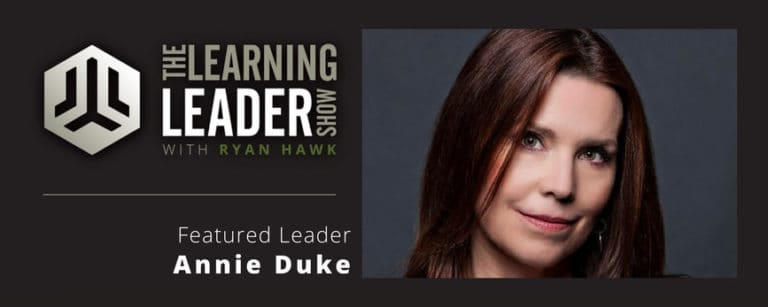Annie Duke is a woman who has leveraged her expertise in the science of smart decision making to excel at pursuits as varied as championship poker to public speaking. For two decades, Annie was one of the top poker players in the world. In 2004, she bested a field of 234 players to win her first World Series of Poker (WSOP) bracelet. The same year, she triumphed in the $2 million winner-take-all, invitation-only WSOP Tournament of Champions. In 2010, she won the prestigious NBC National Heads-Up Poker Championship. Prior to becoming a professional poker player, Annie was awarded the National Science Foundation Fellowship. Because of this fellowship, she studied Cognitive Psychology at the University of Pennsylvania. Annie is the best-selling author of Thinking In Bets: How To Make Smarter Decisions When You Don’t Have All The Facts.
Episode 243: Annie Duke – How To Make Smarter Decisions When You Don’t Have All The Facts (Thinking In Bets)
Subscribe on iTunes or Stitcher Radio
The Learning Leader Show
“Learning occurs when you make a decision and have feedback.”
Show Notes:
- Sustained Excellence =
- Open-minded to people who disagree with them
- They ask “Why am I wrong?”
- Using “I don’t know” or “I’m not sure” shows immense security in oneself. Great leaders do this.
- The “half-life of facts” should never be 100% certain — “It does you a disservice in becoming more knowledgeable if you are certain you are right”
- Hidden information — Invite others to share information with you… To collaborate
- “Here’s what I think, but I don’t know…” –> We’re trained from an early age that those are dirty words, but they shouldn’t be. We’re supposed to always know, but having that mentality limits what you can learn
- Put systems in place to allow exploration of alternative strategies
- Do a deeper dive, consider all reactions. This will help you prepare in case something goes wrong. You can put plans in place by acting in this manner
- Why write Thinking In Bets? Annie has a unique background: cognitive psychology, professional poker, decision making under pressure. In poker: decision making is fast and furious (a hand of poker is 2 minutes)
- “Learning occurs when you make a decision and have feedback”
- The art of boosting academic research with stories and popular culture — Seinfeld, The Super Bowl
- Listen to the disagreement Annie and I have in regards to Pete Carroll’s decision to throw a pass on the goal line at the end of The Super Bowl (around the 24:00 mark)
- Most people are “resulting.” They are not measuring the decision-making process with all the facts, they just view the result. That is wrong.
- Resulting – “Using the outcome as the sole determination if the decision was good or bad”
- While Annie and I disagree, we both had an open mind to what each other had to say and considered the other person’s point of view
- A good approach in your business = Analyze the decision-making process prior to knowing the result
- Example: If a number of people are interviewing the same candidate (separately), the boss should wait to offer her opinion until the end. Her thoughts will skew the feedback she needs from her teamCommonalities of great CEO poker players = They don’t think they’re good at poker. They recognize they aren’t as good as the pros and they work to put themselves in higher odd situations to “get lucky.” (Listen around 45:00 to get the full context)
- How to be a good heads up poker player? Recognize your strengths and weaknesses vs that particular opponent. If you deem they are better than you, then look for “coin flip” situations (example: Ace King vs a pair of 7’s). If you are better than your opponent then avoid coin flips and extend the match. The longer the match, the better the odds for the better player to win The importance of accountability:
- How often does someone spout off without thinking? If you follow that up with, “You wanna bet?” How do they respond? They probably rethink what they’ve said. We should always “think in bets.” Think of our decisions as being “bet worthy.” If someone says, “You wanna bet?” We should be in the position to say yes. If we’re not, then we need to rethink what comes out of our mouths and the decisions we are making.
- “A bet is just a decision based on a belief that you think is how something will turn out.”
- If we think in bets, it forces us to seek out as much information as possible prior to making a decision.
- That is a good thing and will help us make better decisions
- How to be a good heads up poker player? Recognize your strengths and weaknesses vs that particular opponent. If you deem they are better than you, then look for “coin flip” situations (example: Ace King vs a pair of 7’s). If you are better than your opponent then avoid coin flips and extend the match. The longer the match, the better the odds for the better player to win The importance of accountability:
“A bet is a decision based on a belief that you think is how something will turn out.”
Social Media:
- Read: Thinking In Bets
- Follow Annie on Twitter: @AnnieDuke
- Connect with me on LinkedIn
- Join our Facebook Group: The Learning Leader Community
- To Follow Me on Twitter: @RyanHawk12
More Learning:
Episode 078: Kat Cole – From Hooters Waitress To President of Cinnabon
Episode 216: Jim Collins — How To Go From Good To Great
Episode 179: How To Sustain Excellence – The Best Answers From 178 Questions
Episode 107: Simon Sinek – Leadership: It Starts With Why

